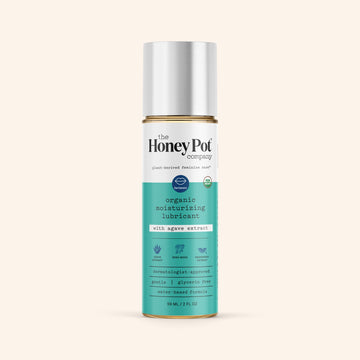Spotting something unusual with your vaginal discharge can set off internal alarm bells — especially when it starts looking more like a breakfast option. Yep, we're talking about the unexpected cottage cheese texture.
Before you hit the panic button or dive into a deep web search that leads you down a rabbit hole of misinformation, let's talk facts. Your body is a complex ecosystem, and every now and then, it sends out signals that something's up.
A change in discharge can be one of those signals, prompting a "Hey, let's check this out" rather than an all-out "SOS!" Understanding what's behind the curtain can turn confusion into clarity — and that's exactly where we step in.
What Causes Cottage Cheese-Like Discharge?
When you notice your discharge has taken on a cottage cheese-like appearance, a few key culprits could be at play.
Let's break them down:
Yeast Infections (Candidiasis)
The most common instigator, yeast infections, occur when there's an overgrowth of Candida albicans in your vaginal flora. This fungus is usually a harmless resident, but when it throws a party without limits, symptoms like thick, white discharge can show up.
Additional symptoms include:
- A burning sensation — especially when you’re peeing or getting intimate
- Redness and swelling of the vulva
- Soreness below the belt
Bacterial Vaginosis (BV)
While the discharge from this common bacterial infection often leans more towards thin and grayish, some vagina owners might experience a thicker discharge. It's all about an imbalance between the good and not-so-good bacteria.
When it comes to BV, these symptoms are pretty par for the course:
- A fishy odor that becomes more noticeable after sex
- Mild itching or a slight burning sensation
- A sense of discomfort within the vaginal area
Trichomoniasis
This sexually transmitted infection (STI) can also change the game, typically resulting in a frothy, yellow, or greenish discharge. But in some cases, the texture may appear more varied, prompting a closer look.
Think you’re dealing with Trich? Look out for these additional cues:
- An itch that just won’t quit
- Pain during intimate moments
- Irritation that lingers
Hormonal Fluctuations
Changes in your hormone levels (think menstrual cycle, birth control, or menopause) can also tweak the consistency of your discharge, making it thicker at times.
If hormones are in the driver’s seat, you might notice a few extra symptoms:
- Variations in the amount of discharge, with some phases of your cycle bringing more than usual.
- Shifts in the color and texture of your discharge throughout your cycle, from clear and stretchy around ovulation to thicker and creamier at other times.
- An overall sense of your vaginal health feeling a bit off-kilter — as if your body's usual rhythms are just slightly out of tune.
When To Book an Appointment With Your OB
After navigating the wilds of vaginal discharge, it's crucial to know when to call in the pros. Here's the lowdown on when booking that appointment goes from "maybe" to "must":
- Persistent Symptoms. Any symptoms that laugh in the face of home remedies and over-the-counter attempts are worth noting. If you're playing a never-ending game of symptom whack-a-mole — it's time.
- Unfamiliar Symptoms Manifest. When your body starts throwing curveballs that leave you scratching your head, a healthcare pro can help make sense of it all.
- Discomfort. If your pain escalates to a level where your daily jig becomes a hobble, it’s time to get checked out. If discomfort turns your day-to-day into an obstacle course, get on the phone.
- Concern Over STIs. If there's even a sliver of doubt about STIs or if your discharge's behavior hints at something more than a simple imbalance, professional insight is non-negotiable.
- First-Time Symptoms. These can be especially daunting. Facing something new? It's time to team up with a practitioner who's equipped with the knowledge and resources to guide you through.
Your healthcare provider has the expertise, the tests, and the treatments to get you back to feeling like the queen of your castle. So, when in doubt, reach out. Your vaginal health is worth it, and so are you.
Tips To Keep Your Vaginal Health on Point
Keeping your vaginal wellness on point doesn't have to be rocket science. With a few smart moves and a little help from your friends here at The Honey Pot — you're all set.
Here's how to keep things feeling fresh and balanced:
Routine Checkups Are Non-Negotiable
Don’t wait for the alarm bells. Regular visits to your healthcare provider, including routine pelvic exams and pap smears, ensure everything is as it should be. Catching potential issues like HPV or cervical cancer early can make all the difference.
Swab and Tell
If something feels off, a quick visit to your OB-GYN for a swab test can clarify things. Whether it’s diagnosing yeast infections, bacterial vaginosis, or STIs like chlamydia and gonorrhea, knowing is half the battle.
Over-the-Counter Wisdom
Not all heroes wear capes — some come in the form of antifungal creams and gels. For early signs of a yeast infection, these can be your first line of defense. Just make sure to follow the instructions to the letter.
Be Mindful of Your Menstrual Products
Whether you're Team Tampon, pad, or menstrual cup, choosing products that respect your body's natural environment is key. Our menstrual solutions are designed with your vaginal health in mind, offering comfort without compromise.
Cotton Underwear for the Win
It’s practically a health requirement. Keeping things airy and breathable down there helps maintain your vaginal health by preventing moisture buildup — a prime environment for yeast overgrowth.
Take a Chill Pill
High stress can mess with your body in all sorts of ways, including your vaginal health. Find your chill with activities like yoga or meditation to help keep your stress levels — and your vaginal ecosystem — in harmony.
Embrace the Lactobacillus
This beneficial bacteria is your vagina's best friend. You can support its population through a balanced diet and our Prebiotic Wash to maintain that natural balance and ward off unwanted guests.
The Lowdown on Douching
In a word? Don’t. It disrupts the natural balance of your vaginal flora, doing more harm than good. Your vagina is a self-cleaning oven — trust the process.
For Those Personal Moments
Our Intimacy Cleansing Wipes are crafted with love and care, keeping you feeling refreshed and balanced before and after intimate moments. Plus, they’re great for a quick refresh during your menstrual cycle or after a workout. What’s not to love?
Educate Yourself on Contraception Options
Hormonal changes from birth control can mess with your vaginal discharge and overall health. If you notice changes, have a little chit-chat with your healthcare provider about alternatives that might better suit your body’s needs.
Say “Yes” to Boric Acid
When your vagina's throwing a pH tantrum, boric acid can step in to calm things down. Our Boric Acid & Herbs Suppositories? Think of them as your go-to for getting back to that happy place — no fuss, no muss.
The Bottom Line
So, that cottage cheese situation? It's just your body's way of waving a little flag, looking for some TLC. Whether it's hinting at something simple like a yeast takeover or signaling something that needs a pro's glance, you've got the power to decode and deal.
Here at Honey Pot, we’re all about empowering you to live comfortably and confidently — from boric acid suppositories that support a healthy pH to gentle washes that keep you feeling fresh; we’ve got your back and your front.
Got questions or need a little guidance? That’s what we’re here for. Keep it real, keep it healthy, and remember, we’re just a click away for all your down-there care needs.
Sources:
Vaginal Candidiasis | Fungal Diseases | CDC
CDC - Bacterial Vaginosis Statistics | CDC.gov
STD Facts - Trichomoniasis | Centers for Disease Control and Prevention






